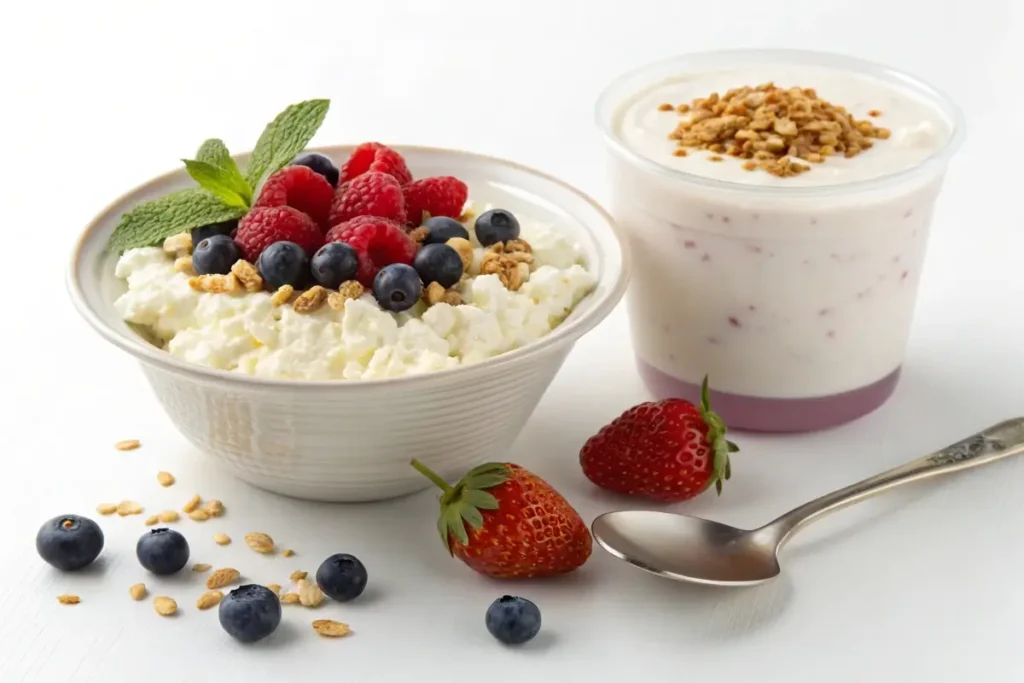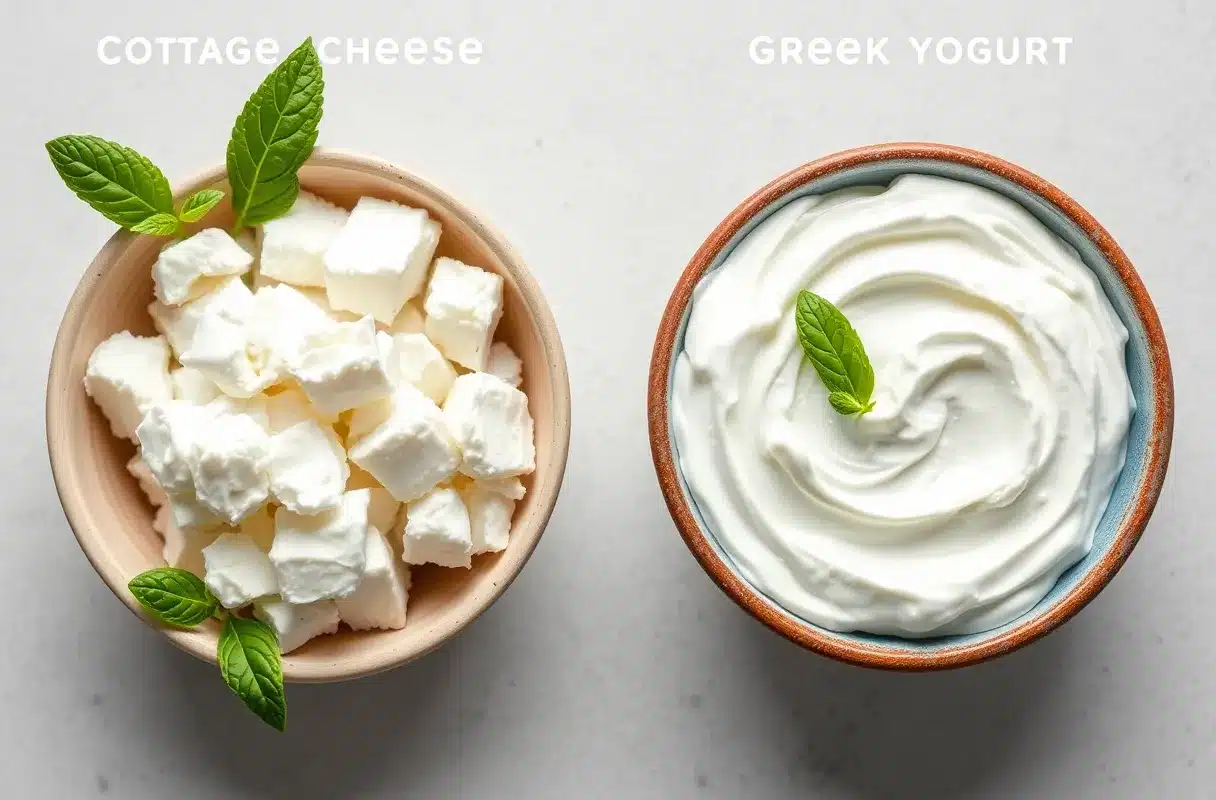Is cottage cheese healthier than yogurt? This is a question many health enthusiasts often debate. Both cottage cheese and yogurt are nutrient-dense, versatile, and loved by people worldwide. While they share similarities, their nutritional profiles and benefits differ. In this article, we’ll explore these differences and provide a detailed comparison to help you decide which is healthier for your diet and lifestyle.
Nutritional Comparison (Is cottage cheese healthier than yogurt?)
1. Protein Content
Cottage cheese is a powerhouse of protein, with a half-cup serving providing approximately 14 grams. Yogurt, depending on the type, offers about 8-10 grams of protein per serving.
- Winner: Cottage Cheese, especially for those looking to boost protein intake.
2. Calorie Count
Cottage cheese and yogurt are both low in calories. However, cottage cheese tends to have slightly more calories due to its fat content. For example:
- 1/2 cup of low-fat cottage cheese: 100-120 calories
- 1 cup of plain Greek yogurt: 80-100 calories
- Winner: Yogurt, for calorie-conscious individuals.
3. Fat Content
Cottage cheese comes in various fat levels, ranging from fat-free to full-fat options. Yogurt offers similar options, but Greek yogurt tends to be lower in fat than full-fat cottage cheese.
- Winner: Yogurt, for those seeking low-fat options.
4. Sugar Content
Yogurt, especially flavored varieties, can have added sugars. Cottage cheese is often naturally lower in sugar.
- Winner: Cottage Cheese, if avoiding added sugars is your priority.
Health Benefits (Is cottage cheese healthier than yogurt?)
1. Gut Health cottage cheese or yogurt

Yogurt contains probiotics, such as Lactobacillus and Bifidobacterium strains, that promote healthy gut bacteria, aiding digestion and improving overall gut health. Cottage cheese may also contain probiotics if labeled as such, but it is less common.
- Winner: Yogurt, for its probiotic content.
2. Bone Health cottage cheese or yogurt
Both cottage cheese and yogurt are rich in calcium, essential for bone strength. However, yogurt often has added vitamin D, enhancing calcium absorption.
- Winner: Yogurt, for enhanced calcium absorption.
3. Muscle Recovery cottage cheese or yogurt
Cottage cheese is rich in casein protein, which digests slowly and supports muscle recovery overnight. Yogurt, especially Greek yogurt, provides quick-digesting protein ideal post-workout.
- Winner: Tie, depending on your fitness goals.
4. Weight Management cottage cheese or yogurt
Both are low-calorie options that can aid in weight management. However, yogurt’s probiotics may help regulate digestion and metabolism.
- Winner: Yogurt, for its potential metabolism-boosting effects.
5. Skin and Hair Health cottage cheese or yogurt
The nutrients in yogurt and cottage cheese, such as zinc and selenium, contribute to glowing skin and healthy hair. Cottage cheese’s protein supports tissue repair, while yogurt’s probiotics help reduce skin inflammation.
- Winner: Tie, depending on the nutrients you prioritize.

Culinary Uses
1. Versatility
Cottage cheese works well in savory dishes like lasagnas, salads, and casseroles. Yogurt shines in sweet recipes, smoothies, and as a base for desserts. Explore savory recipes with cottage cheese here.
2. Ease of Preparation
Both can be consumed as-is or enhanced with fruits, nuts, or spices. However, yogurt’s smooth texture often makes it easier to incorporate into recipes.
3. Creative Combinations
- Combine cottage cheese with avocado and spices for a creamy dip.
- Mix yogurt with honey and granola for a quick breakfast.
- Layer cottage cheese and yogurt in parfaits for the best of both worlds. Discover parfait recipes here.
4. Specialized Uses
- Cottage cheese can replace ricotta in lasagnas and baked dishes for a higher protein option.
- Yogurt is an excellent marinade for meats and a tenderizer for certain recipes.

Environmental Impact
Yogurt generally requires less milk to produce than cottage cheese, making it slightly more environmentally friendly.
- Winner: Yogurt, for its lower environmental footprint.
Which Is Better for Your Diet?
1. For Weight Loss
- Choose yogurt, particularly plain Greek yogurt, as it’s lower in calories and fat.
2. For Muscle Gain
- Opt for cottage cheese, as its high protein content supports muscle recovery and growth.
3. For Digestive Health
- Stick with yogurt, thanks to its probiotic benefits.
4. For Balanced Meals
- Use cottage cheese for savory dishes and yogurt for sweeter recipes to diversify your meals.
5. For Budget-Friendly Choices
Cottage cheese is often more cost-effective than premium Greek yogurt, making it ideal for budget-conscious shoppers.
How to Incorporate Both Into Your Diet

1. Breakfast Ideas
- Savory Start with Cottage Cheese: Top cottage cheese with sliced cucumbers and tomatoes for a fresh and satisfying breakfast.
- Smoothie Base with Yogurt: Use yogurt as a base for smoothies with fresh fruits, spinach, and a touch of honey.
2. Snack Options
- Cottage Cheese and Crackers: Spread cottage cheese on whole-grain crackers for a quick, protein-packed snack.
- Yogurt and Nuts: Pair yogurt with a handful of mixed nuts for a balanced and energizing snack.
3. Desserts
- Cottage Cheese Mousse: Blend cottage cheese with cocoa powder and a sweetener for a creamy, healthy chocolate mousse.
- Frozen Yogurt Popsicles: Use yogurt mixed with fresh fruit puree to create refreshing frozen popsicles.
4. Post-Workout Meals
- Cottage Cheese and Pineapple: Enjoy a bowl of cottage cheese topped with fresh pineapple for a protein boost.
- Chia Yogurt Mix: Combine yogurt with chia seeds and a drizzle of maple syrup for a recovery snack packed with nutrients.
5. Unique Recipes
- Herbed Cottage Cheese Spread: Whip cottage cheese with fresh herbs and spices to create a savory spread for bread or crackers.
- Moist Yogurt Muffins: Incorporate yogurt into muffin batter for added moisture and a subtle tang.
Cultural Uses
Cottage cheese and yogurt are staples in many traditional cuisines worldwide. In India, yogurt is the base for dishes like raita and lassi, while paneer, a form of cottage cheese, is used in curries. Eastern European dishes, such as pierogies and syrniki, often incorporate cottage cheese. Meanwhile, Middle Eastern cuisine features labneh, a yogurt-based spread with a tangy flavor. These cultural uses highlight the versatility of both cottage cheese and yogurt, making them beloved ingredients across the globe.
Cottage Cheese vs. Yogurt for Athletes
Athletes often debate between cottage cheese and yogurt for their nutritional benefits. Cottage cheese, high in casein protein, is ideal for overnight muscle recovery, as it provides a slow release of amino acids.
Greek yogurt, on the other hand, delivers quick-digesting whey protein, perfect for post-workout recovery. Both options can support athletic performance, with yogurt offering additional probiotic benefits for gut health.
Comparing Cottage Cheese and Yogurt for Kids
For children, yogurt is often the preferred choice due to its smooth texture and naturally sweetened options, making it more appealing. Greek yogurt, in particular, offers a high-protein snack that supports growth.
Cottage cheese, while equally nutritious, may require creative preparation, such as blending it with fruits or incorporating it into meals, to make it more palatable for kids. Both are excellent sources of calcium, essential for bone development.
Sustainability Factors in Dairy Production
The production processes of cottage cheese and yogurt differ significantly in their environmental impact. Yogurt typically requires less milk to produce the same serving size compared to cottage cheese, making it more sustainable.
Additionally, yogurt producers increasingly focus on recyclable packaging and waste reduction, while cottage cheese often comes in plastic containers. Consumers mindful of sustainability may prefer yogurt for its lower carbon footprint.
The Rise of Plant-Based Alternatives
As plant-based diets gain popularity, alternatives to cottage cheese and yogurt are on the rise.
Almond-based yogurts and tofu-based cottage cheese provide options for vegan and lactose-intolerant individuals. While these alternatives may lack the exact texture and taste of their dairy counterparts, they often include added nutrients like calcium and vitamin D to mimic their benefits. Exploring plant-based versions expands accessibility to these beloved foods.
Frequently Asked Questions (FAQs)
1. Is cottage cheese better than yogurt for weight loss?
Cottage cheese can be a better option for weight loss due to its higher protein content and lower sugar levels. However, non-fat Greek yogurt is also an excellent choice for its lower calories and probiotics.
2. Is cottage cheese or Greek yogurt better for digestion?
Greek yogurt is generally better for digestion because of its rich probiotic content, which promotes gut health. Cottage cheese may support digestion if it contains added probiotics, but it is less common.
3. What are the pros and cons of eating cottage cheese?
Pros: High in protein, low in sugar, and versatile in recipes. Cons: May contain high sodium and lack probiotics unless specifically added.
4. Can cottage cheese replace yogurt?
Cottage cheese can replace yogurt in many recipes, especially savory ones. However, for probiotic benefits and sweet recipes, yogurt is preferable.
5. Will I lose weight if I eat cottage cheese everyday?
Eating cottage cheese daily can aid weight loss due to its high protein content and low calorie count. Pair it with a balanced diet for the best results.
6. What has more protein, eggs or cottage cheese?
Cottage cheese has more protein than eggs. A half-cup of cottage cheese contains about 14 grams, while one large egg provides 6 grams.
7. Why does cottage cheese burn belly fat?
Cottage cheese helps burn belly fat by providing high-quality protein that promotes muscle growth and satiety, reducing overall calorie intake.
8. How much cottage cheese should I eat a day?
Consuming 1/2 to 1 cup of cottage cheese daily is sufficient to enjoy its nutritional benefits without overloading on sodium or calories.
9. Is it OK to eat yogurt and cottage cheese everyday?
Yes! Eating both daily offers a balance of probiotics, protein, and essential nutrients. Alternate between the two for variety and maximum benefits.
10. Does cottage cheese heal gut?
Cottage cheese can support
Conclusion (Is cottage cheese healthier than yogurt?)
Is cottage cheese healthier than yogurt? The answer ultimately depends on your personal dietary needs and goals. Cottage cheese stands out for its higher protein content, making it an excellent choice for muscle building and satiety.
Yogurt, particularly Greek yogurt, shines in digestive health due to its probiotic content and lower calorie count.
For weight loss, yogurt’s versatility and low-fat options make it a go-to choice. For muscle recovery and longer-lasting fullness, cottage cheese takes the lead.
Both foods complement each other beautifully, offering unique benefits that can fit into a variety of meals and snacks.
Incorporating both into your diet can provide a balanced intake of essential nutrients, enhancing your overall health. Whether you prioritize gut health, weight management, or protein intake, choosing between cottage cheese and yogurt—or enjoying both—can support a healthy lifestyle.
